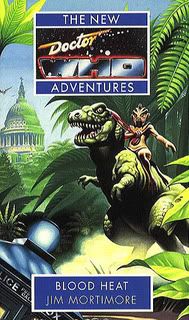 Blood Heat by Jim Mortimore
In Brief: The TARDIS is attacked by an alien force; Bernice is flung into the Vortex; and the Doctor and Ace crash-land on Earth. However this is an Earth that has been ruled by the Silurians since they killed the Doctor 20 years ago...
I'm not quite sure how I feel about Blood Heat. I know that I've been accused in the past of not being obvious in regards to if I like/don't like something (unlike when I have a severe hate-on, then you all know about it) but I can't rise above a sense of ambivalence about this book. It wasn't bad, the writing and characterisation is good but there's just a sense of something missing. That something possibly being a plot. As with Jim Mortimore's earlier co-authored Lucifer Rising the book is more interested in exploring a locale than telling a story. While there's no reason such a novel can't work there a few things that get in the way of that happening here.
First is the actual setting, or namely that it's not very interesting. What seems to be a parallel Earth actually turns out to be a sub-Universe that has been created by an as-yet-unknown something or someone in order to trap the Doctor (which will run through the next few novels in the series). Blood Heat takes place after the Doctor has somehow been killed during the events of the televised 1970 story Doctor Who and the Silurians (yes, that's what it's called). With no Doctor to stop their plague in that story humanity has been almost destroyed as the original masters of Earth terraform the planet back to the Jurassic.
So this is a "what-if" scenario as we have the Doctor and Ace (Benny is missing for almost the whole book) meeting a human resistance led by the UNIT "team" of The Brigadier, Liz Shaw and Sergeant Benton.
Jo Grant also shows up, but is feral after being hunted by the Silurians for 2 decades.
Using these old characters is probably why the book felt a bit hollow. Rather than going somewhere new the book does a retread of older Who, albeit in altered form. Also I realised there's very little description or context given to The Brig or Liz, the novel expects the reader to know already know the characters and their relation to each other. This made sense back in 1993, when this book was published, since in the same year we had the original 1970 story released on VHS as well as the magazine having several months of a Silurian-related comic strip. With it being the show's 30th-anniversary at the time this rehashing of the past was very deliberate. However now in 2010 expecting an audience to automatically know the set-up of a previous era of the show just wouldn't happen.
That's probably a good thing. If any lesson can be learned from the mess that was the mid-80s it's that Doctor Who shouldn't ever get too bogged down in the past.
And if only Star Trek would have learned that lesson there might still be some form of that show on TV. And Enterprise wouldn't exist.
Another factor which makes Blood Heat feel a bit off is that with it being very much based on the earlier Silurian tale it's imbued with that story's oddness. "Doctor Who and the Silurians" is (I think) the only serial that completely follows the "exiled on Earth" format they tried in the early-70s with the Doctor working for the military/UNIT. There's no mention or appearance of the TARDIS or the fact that the Doctor is an alien. And with the Silurians actually being older inhabitants of Earth it technically doesn't even have aliens in it. Also Liz Shaw is in many ways a "companion" like no other. Originally intended to me more of an equal to the Doctor she takes a very active role in all of her stories, although never actually steps foot in the Tardis.
Blood Heat by Jim Mortimore
In Brief: The TARDIS is attacked by an alien force; Bernice is flung into the Vortex; and the Doctor and Ace crash-land on Earth. However this is an Earth that has been ruled by the Silurians since they killed the Doctor 20 years ago...
I'm not quite sure how I feel about Blood Heat. I know that I've been accused in the past of not being obvious in regards to if I like/don't like something (unlike when I have a severe hate-on, then you all know about it) but I can't rise above a sense of ambivalence about this book. It wasn't bad, the writing and characterisation is good but there's just a sense of something missing. That something possibly being a plot. As with Jim Mortimore's earlier co-authored Lucifer Rising the book is more interested in exploring a locale than telling a story. While there's no reason such a novel can't work there a few things that get in the way of that happening here.
First is the actual setting, or namely that it's not very interesting. What seems to be a parallel Earth actually turns out to be a sub-Universe that has been created by an as-yet-unknown something or someone in order to trap the Doctor (which will run through the next few novels in the series). Blood Heat takes place after the Doctor has somehow been killed during the events of the televised 1970 story Doctor Who and the Silurians (yes, that's what it's called). With no Doctor to stop their plague in that story humanity has been almost destroyed as the original masters of Earth terraform the planet back to the Jurassic.
So this is a "what-if" scenario as we have the Doctor and Ace (Benny is missing for almost the whole book) meeting a human resistance led by the UNIT "team" of The Brigadier, Liz Shaw and Sergeant Benton.
Jo Grant also shows up, but is feral after being hunted by the Silurians for 2 decades.
Using these old characters is probably why the book felt a bit hollow. Rather than going somewhere new the book does a retread of older Who, albeit in altered form. Also I realised there's very little description or context given to The Brig or Liz, the novel expects the reader to know already know the characters and their relation to each other. This made sense back in 1993, when this book was published, since in the same year we had the original 1970 story released on VHS as well as the magazine having several months of a Silurian-related comic strip. With it being the show's 30th-anniversary at the time this rehashing of the past was very deliberate. However now in 2010 expecting an audience to automatically know the set-up of a previous era of the show just wouldn't happen.
That's probably a good thing. If any lesson can be learned from the mess that was the mid-80s it's that Doctor Who shouldn't ever get too bogged down in the past.
And if only Star Trek would have learned that lesson there might still be some form of that show on TV. And Enterprise wouldn't exist.
Another factor which makes Blood Heat feel a bit off is that with it being very much based on the earlier Silurian tale it's imbued with that story's oddness. "Doctor Who and the Silurians" is (I think) the only serial that completely follows the "exiled on Earth" format they tried in the early-70s with the Doctor working for the military/UNIT. There's no mention or appearance of the TARDIS or the fact that the Doctor is an alien. And with the Silurians actually being older inhabitants of Earth it technically doesn't even have aliens in it. Also Liz Shaw is in many ways a "companion" like no other. Originally intended to me more of an equal to the Doctor she takes a very active role in all of her stories, although never actually steps foot in the Tardis.
 But being smart didn't mean she couldn't wear mini-skirts that Amy Pond would find short.
She's not well remembered since as well as only lasting a single season a new producer decided the show worked better with a less-mature female character who would be more prone to get into trouble/trip over twigs (and need saving). Hence Jo Grant.
Although the mini-skirts remained.
In Blood Heat Liz takes centre-stage, being the moral centre for much of the book especially in trying to stop this alternative bloodthirsty Brigadier from trying to nuke the Silurians. I seem to remember that at the time the character was showing up a lot in Who-related fiction. I suspect this is probably due to a lot of people making the books/comics/what-not at the time were trying to move away from Doctor Who as being "that silly kids show" so embraced Liz and her more equal-to-the-Doctor ways. As if being "silly" is what had taken the show off of television.
So with the early-70s UNIT trappings Blood Heat feels like a throw-back to that more "serious" pre-Jo Grant time of the show. But because we're so obviously in "what-if" territory and there will obviously have to be a big reset at the end to get things "right" it means that it was hard to really feel involved with events. Thankfully Mortimore is able to somewhat overcome this problem with some very good characterisation and also by keeping events fairly interesting, barring one or two unneeded action scenes.
I realise that I'm sort of circling actually analysing the book itself; the problem is that there's not really a whole lot to discuss. The only things that really *happen* is that the Tardis crashes/breaks-apart at the beginning and then plunges into a tar-pond (then the Doctor takes over the 3rd-Doctor's alternative Tardis rather than retrieving the original. Don't ask.) and after a lot of wandering around a ruined London there's a missile scare at the end as the Brigadier tries to destroy the Silurians (while is all resolved by...the Doctor flipping some switches. Some things never change.). Again thankfully Mortimore has enough skill as an author to keep the setting interesting, particularly in showing an England devastated by plague and being taken over by primeval jungle. Although he does get a bit heavy-handed at times with the moralising. Also the ending is quite poor as the book becomes all follow-up and no resolution (or rather an extremely brief resolution). The entire alternate-Earth is "corrected" by the Doctor fiddling with the Tardis a bit, which basically negates everything that happens over the previous 250 pages.
But the BIG problem is that (even moreso than Iceberg) the book is completely based on assuming that the reader has seen or knows about an older story. While earlier uses of continuity have been annoying this is the first time that an entire book has been so reliant on it. Blood Heat is the series trying something different but for the first time it's not in a good way. It's all just too caught up in the past to work. The funny thing is that I remembered really liking this book at the time, but then that was a world where the show had been off the air for over 4 years.
While other books have had some trappings of being from the early-90s this is the first time (well, Timewyrm: Genesis I think may have the same problem) that I've come across a book which *only* could have worked in 1993. It's definitely not a bad novel (and after crap like Deceit and Shadowmind believe me I know bad novels) but it's just aged very poorly after 17 years.
But that's saying something that this is probably the first time I've really run into that problem after almost 20 books.
And despite not being great it's still the best use of the Silurians since 1970, this year's 2-parter included.
But being smart didn't mean she couldn't wear mini-skirts that Amy Pond would find short.
She's not well remembered since as well as only lasting a single season a new producer decided the show worked better with a less-mature female character who would be more prone to get into trouble/trip over twigs (and need saving). Hence Jo Grant.
Although the mini-skirts remained.
In Blood Heat Liz takes centre-stage, being the moral centre for much of the book especially in trying to stop this alternative bloodthirsty Brigadier from trying to nuke the Silurians. I seem to remember that at the time the character was showing up a lot in Who-related fiction. I suspect this is probably due to a lot of people making the books/comics/what-not at the time were trying to move away from Doctor Who as being "that silly kids show" so embraced Liz and her more equal-to-the-Doctor ways. As if being "silly" is what had taken the show off of television.
So with the early-70s UNIT trappings Blood Heat feels like a throw-back to that more "serious" pre-Jo Grant time of the show. But because we're so obviously in "what-if" territory and there will obviously have to be a big reset at the end to get things "right" it means that it was hard to really feel involved with events. Thankfully Mortimore is able to somewhat overcome this problem with some very good characterisation and also by keeping events fairly interesting, barring one or two unneeded action scenes.
I realise that I'm sort of circling actually analysing the book itself; the problem is that there's not really a whole lot to discuss. The only things that really *happen* is that the Tardis crashes/breaks-apart at the beginning and then plunges into a tar-pond (then the Doctor takes over the 3rd-Doctor's alternative Tardis rather than retrieving the original. Don't ask.) and after a lot of wandering around a ruined London there's a missile scare at the end as the Brigadier tries to destroy the Silurians (while is all resolved by...the Doctor flipping some switches. Some things never change.). Again thankfully Mortimore has enough skill as an author to keep the setting interesting, particularly in showing an England devastated by plague and being taken over by primeval jungle. Although he does get a bit heavy-handed at times with the moralising. Also the ending is quite poor as the book becomes all follow-up and no resolution (or rather an extremely brief resolution). The entire alternate-Earth is "corrected" by the Doctor fiddling with the Tardis a bit, which basically negates everything that happens over the previous 250 pages.
But the BIG problem is that (even moreso than Iceberg) the book is completely based on assuming that the reader has seen or knows about an older story. While earlier uses of continuity have been annoying this is the first time that an entire book has been so reliant on it. Blood Heat is the series trying something different but for the first time it's not in a good way. It's all just too caught up in the past to work. The funny thing is that I remembered really liking this book at the time, but then that was a world where the show had been off the air for over 4 years.
While other books have had some trappings of being from the early-90s this is the first time (well, Timewyrm: Genesis I think may have the same problem) that I've come across a book which *only* could have worked in 1993. It's definitely not a bad novel (and after crap like Deceit and Shadowmind believe me I know bad novels) but it's just aged very poorly after 17 years.
But that's saying something that this is probably the first time I've really run into that problem after almost 20 books.
And despite not being great it's still the best use of the Silurians since 1970, this year's 2-parter included.
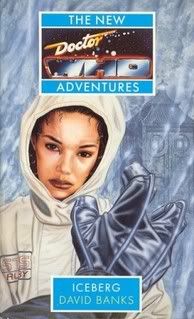 Iceberg by David Banks.
In Brief: The futuristic year of 2006 is home to an Antarctic research-base trying to stop the Earth's magnetic poles from reversing. The Doctor, travelling solo, arrives on a nearby cruise-ship and discovers a plot by the Cybermen to take over the planet.
Again.
Iceberg really shouldn't work. Any of its ingredients taken on their own (The Doctor alone, the "near"-future, links to multiple past stories, the Cybermen, etc.) would normally be an exercise in tedium. However somehow David Banks has managed to put all of the parts together in such a way that, while not great literature, is very enjoyable. I think what makes the book work is that (unlike most of their television stories) Banks doesn't see the Cybermen just as a droning replacement for the Daleks or other monsters but instead remembers their original intent as a sort of proto-Borg 60s "fear of organ replacement" creation. It must have helped that he'd earlier written a book linking together all of "Cyber-History" (there's an entire sub-genre of Who-books based around trying to figure out its continuity) as well as his playing the Cyberleader in every 1980s Cyberman story (yes, really).
Iceberg by David Banks.
In Brief: The futuristic year of 2006 is home to an Antarctic research-base trying to stop the Earth's magnetic poles from reversing. The Doctor, travelling solo, arrives on a nearby cruise-ship and discovers a plot by the Cybermen to take over the planet.
Again.
Iceberg really shouldn't work. Any of its ingredients taken on their own (The Doctor alone, the "near"-future, links to multiple past stories, the Cybermen, etc.) would normally be an exercise in tedium. However somehow David Banks has managed to put all of the parts together in such a way that, while not great literature, is very enjoyable. I think what makes the book work is that (unlike most of their television stories) Banks doesn't see the Cybermen just as a droning replacement for the Daleks or other monsters but instead remembers their original intent as a sort of proto-Borg 60s "fear of organ replacement" creation. It must have helped that he'd earlier written a book linking together all of "Cyber-History" (there's an entire sub-genre of Who-books based around trying to figure out its continuity) as well as his playing the Cyberleader in every 1980s Cyberman story (yes, really).
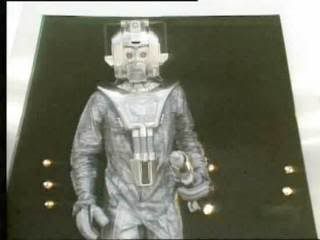 The book's author.
Oh, and he also played The Doctor briefly. If you know the context you win a cookie.
It's interesting that despite being the centre of the Metal Meanies from Mondas' revival in the 1980s Banks seems to have much more affection for the 60s more "robotic" version. This is obvious since Iceberg almost plays as a sequel to the Cybermen's attempted invasions in stories from that era.
It is best never to discuss their only 1970s appearance ("Revenge of the Cybermen"). Or worse to actually watch their only 1970s appearance ("Revenge of the Cybermen").
While it also may seem odd to have a book written in the early-90s based around stories made 25 years earlier a few things from that time are important. First, in 1993 Whodom was still in the thrall of the surprise rediscovery of 1967's "The Tomb of the Cybermen" in a vault in Hong Kong. For the TV-show starved masses it was like getting a whole new adventure. Also a hoax around the same time (which actually made it into Doctor Who Magazine) that the final (missing) episode of the Cybermen's debut in "The Tenth Planet" had been returned was making the rounds which made that story of great interest. Lastly the remaining episodes of 1960s stories "The Moonbase","The Wheel in Space" and "The Invasion" were released on VHS around the same period.
So 1993 was really the year of the Cybermen for Doctor Who fans. Many were getting to see the earlier stories for the first time and finding these Cybermen to be an interesting contrast to their more recent appearances. I don't think it's that the 80s Cybermen were rubbish (well except for maybe in 1985's "Attack of the Cybermen"), it's just that for the most part they were Generic Monster #2 who would show up every so often to try to take over a planet while waxing lyrical on the benefits of not having emotions. They were sort of like an army of tin-foil clad Mr.Spocks.
The book's author.
Oh, and he also played The Doctor briefly. If you know the context you win a cookie.
It's interesting that despite being the centre of the Metal Meanies from Mondas' revival in the 1980s Banks seems to have much more affection for the 60s more "robotic" version. This is obvious since Iceberg almost plays as a sequel to the Cybermen's attempted invasions in stories from that era.
It is best never to discuss their only 1970s appearance ("Revenge of the Cybermen"). Or worse to actually watch their only 1970s appearance ("Revenge of the Cybermen").
While it also may seem odd to have a book written in the early-90s based around stories made 25 years earlier a few things from that time are important. First, in 1993 Whodom was still in the thrall of the surprise rediscovery of 1967's "The Tomb of the Cybermen" in a vault in Hong Kong. For the TV-show starved masses it was like getting a whole new adventure. Also a hoax around the same time (which actually made it into Doctor Who Magazine) that the final (missing) episode of the Cybermen's debut in "The Tenth Planet" had been returned was making the rounds which made that story of great interest. Lastly the remaining episodes of 1960s stories "The Moonbase","The Wheel in Space" and "The Invasion" were released on VHS around the same period.
So 1993 was really the year of the Cybermen for Doctor Who fans. Many were getting to see the earlier stories for the first time and finding these Cybermen to be an interesting contrast to their more recent appearances. I don't think it's that the 80s Cybermen were rubbish (well except for maybe in 1985's "Attack of the Cybermen"), it's just that for the most part they were Generic Monster #2 who would show up every so often to try to take over a planet while waxing lyrical on the benefits of not having emotions. They were sort of like an army of tin-foil clad Mr.Spocks.
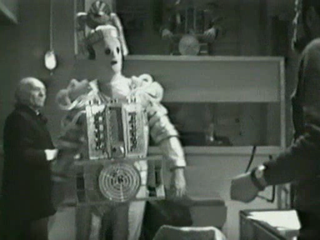 The Cybermen as they were in 1966.
Also in the 80s for the most part the writers had forgotten what made the Cybermen scary back in the day, that they weren't out to conquer but instead to turn everyone into them.
So cosmic Communists to the Daleks' fascism?
So with this aspect of body-horror and loss of personality being brought to the Cybermen works well. Also the book is really more of an extrapolation of the earlier stories rather than a sequel. While seeing those shows is good you still can understand what's going on without in depth detail (so in very "new series" in that respect).
The Cybermen as they were in 1966.
Also in the 80s for the most part the writers had forgotten what made the Cybermen scary back in the day, that they weren't out to conquer but instead to turn everyone into them.
So cosmic Communists to the Daleks' fascism?
So with this aspect of body-horror and loss of personality being brought to the Cybermen works well. Also the book is really more of an extrapolation of the earlier stories rather than a sequel. While seeing those shows is good you still can understand what's going on without in depth detail (so in very "new series" in that respect).
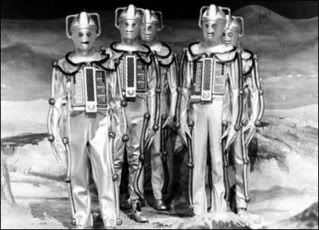 The Cybermen show off their 1967 duds.
But as for the non-Cybermen related parts of the book, unfortunately Banks doesn't do so well. While it's not terrible unfortunately most of his characterisation never rises above caricature (The hard-nosed general! The Camp Actor! The Cynical Artist! The Plucky Reporter!) even for temporary companion Ruby Duvall. The first half or so of the book does drag a bit as we wait what feels like forever for the Doctor to show up in his Tardis-shuttlecraft (aka The Jade Pagoda). Although perhaps this build-up is intentional since another aspect of the 1960s Cybermen stories is how for the most part they're barely in them, rather than lurk in the background for the first half of the story until their big reveal half-way through.
The Cybermen show off their 1967 duds.
But as for the non-Cybermen related parts of the book, unfortunately Banks doesn't do so well. While it's not terrible unfortunately most of his characterisation never rises above caricature (The hard-nosed general! The Camp Actor! The Cynical Artist! The Plucky Reporter!) even for temporary companion Ruby Duvall. The first half or so of the book does drag a bit as we wait what feels like forever for the Doctor to show up in his Tardis-shuttlecraft (aka The Jade Pagoda). Although perhaps this build-up is intentional since another aspect of the 1960s Cybermen stories is how for the most part they're barely in them, rather than lurk in the background for the first half of the story until their big reveal half-way through.
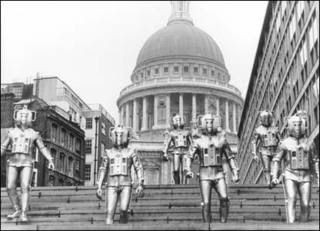 1968. Another year another outfit.
But despite this shortcoming I still enjoyed Iceberg. I think this is probably about as good as a book about the Cybermen can be since there is the problem that perfectly logical robotic beings aren't great conversationalists and therefore are limited from having the requisite gab-fests with the Doctor (The Daleks had the same problem until Davros turned up). And while setting the book in 2006 (remembering it was written in 1993) is a bit silly it doesn't create too many problems. We're missing the Internet, mp3-players, lap-tops and cell phones but there *are* overdone pat-downs for International travel.
1968. Another year another outfit.
But despite this shortcoming I still enjoyed Iceberg. I think this is probably about as good as a book about the Cybermen can be since there is the problem that perfectly logical robotic beings aren't great conversationalists and therefore are limited from having the requisite gab-fests with the Doctor (The Daleks had the same problem until Davros turned up). And while setting the book in 2006 (remembering it was written in 1993) is a bit silly it doesn't create too many problems. We're missing the Internet, mp3-players, lap-tops and cell phones but there *are* overdone pat-downs for International travel.
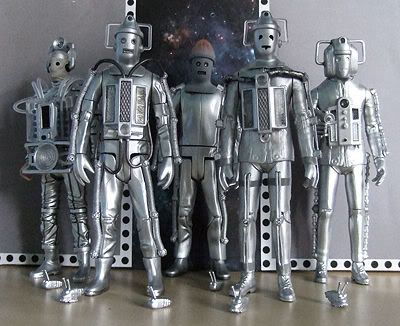 Cyberwant!
So overall a good read. It's starting to feel like the range is getting its groove back.
Oh, and for the record the things that *call* themselves Cybermen in the post-2005 show totally aren't. So there.
Cyberwant!
So overall a good read. It's starting to feel like the range is getting its groove back.
Oh, and for the record the things that *call* themselves Cybermen in the post-2005 show totally aren't. So there.
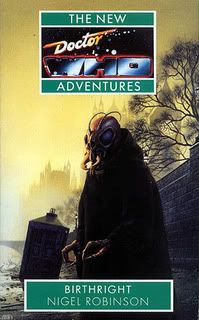 Birthright by Nigel Robinson
In Brief: Bernice has found herself trapped in 1909 London struggling to deal with a killer (and long dresses) while Ace is stuck on a distant planet ruled by the insectoid Charrl. The Doctor (and the Tardis) are nowhere to be found...
First off I can now forget the pain of the awful Shadowmind since I found this to be very good read that helped raise my opinion about the series again. While it's not as envelope-pushing or mind-blowing as other NAs it's very entertaining. Also it's a much better effort than Robinson's earlier Timewyrm: Apocalypse. The only negatives really are a rather poor climax (another virtual landscape and an ending that doesn't really resolve anything) and the author's over-love of 1960s continuity references (of course this was written back in the day when 1967's The Tomb of the Cybermen was the most awesome thing ever since a copy had then recently been rediscovered in Hong Kong). However these minor issues don't really get in the way, and the references to the past are actually made to work within the context of the plot.
One of the things that's been interesting in reading through so many of the New Adventures comparatively quickly (considering originally they were released every month or two) is seeing how the focus of the books has moved more and more away from the Doctor and onto his companions. I think this change was probably necessary in ensuring that the concept could work as books rather than TV. With a few hundred pages of material to fill you need to have interesting characters with depth. With the Doctor being "the alien" it would be too easy to lose all mystery about the character.
So the lion's share of Birthright is given over to Bernice as she's forced to cope with being flung from the Tardis into Edwardian London. However despite his not appearing the Doctor's presence is felt throughout with little clues and coincidences that help Benny. We get the feeling that the events of the book have been set up for Bernice to figure out as some sort of test.
Also the Doctor is busy dealing with the plot of the next book, Iceberg.
It's an interesting idea that hopefully will be brought into the series proper at some point, especially since we now regularly get those "Oh God we can't manage to film everything in time!" Doctor-free episodes every so often. Actually for some reason those often turn out to be season-highlights ("Turn Left" for instance actually made the character of Donna tolerable...)
So while having a Doctor-free novel could have been a disaster (I mean the series is called *Doctor* Who after all) it instead cements Benny as the central character at this point in the series. With her travelling with such a mysterious and alien Doctor as well as a bloodthirsty-soldier version of Ace she really becomes the reader's identification figure. I've often found that Doctor Who, regardless of its medium, really depends on its regulars to keep the viewer/reader's interest. With such a (normally) small regular cast it's not like other programmes that have half-a-dozen characters to choose from if we don't like one. So if the regulars don't work then it can be a struggle to maintain interest. Proof of that can be found in the 1980s when (as one of many problems) there seemed to really be no one on screen that the audience could take some interest in. Gone were the days of Sarah Jane, Jamie, Jo, or even Leela and instead we had the horror of Tegan, Peri and Mel.
That's why Ace in 1987 was so important, she was practically the first truly likeable regular the show had seen since at least the late 70s.
While these characters were never given the depth of Rose or Amy at least the best of them were "likeable".
So with Birthright temporarily taking the Doctor out of the picture and instead concentrating on Bernice we get a really good chance to get to know her. While Ace does show up later on her contribution is small which I think shows how limited that character had really become since coming back into the series (she's really just there to beat people up/shoot them). Also she's now become so paranoid and bitter towards the Doctor's manipulations that she's almost a caricature.
So to sum up while it's not spectacular, Birthright is a very solid entry in the series that helps bring the series "back to earth" after what seems to be a very long time (while I'm all for trying new things it is nice to get back to basics every so often).
Or maybe I just have a soft-spot for Victoriana in Who, for some reason the trappings of the 19th-century always seem to compliment the series well.
Birthright by Nigel Robinson
In Brief: Bernice has found herself trapped in 1909 London struggling to deal with a killer (and long dresses) while Ace is stuck on a distant planet ruled by the insectoid Charrl. The Doctor (and the Tardis) are nowhere to be found...
First off I can now forget the pain of the awful Shadowmind since I found this to be very good read that helped raise my opinion about the series again. While it's not as envelope-pushing or mind-blowing as other NAs it's very entertaining. Also it's a much better effort than Robinson's earlier Timewyrm: Apocalypse. The only negatives really are a rather poor climax (another virtual landscape and an ending that doesn't really resolve anything) and the author's over-love of 1960s continuity references (of course this was written back in the day when 1967's The Tomb of the Cybermen was the most awesome thing ever since a copy had then recently been rediscovered in Hong Kong). However these minor issues don't really get in the way, and the references to the past are actually made to work within the context of the plot.
One of the things that's been interesting in reading through so many of the New Adventures comparatively quickly (considering originally they were released every month or two) is seeing how the focus of the books has moved more and more away from the Doctor and onto his companions. I think this change was probably necessary in ensuring that the concept could work as books rather than TV. With a few hundred pages of material to fill you need to have interesting characters with depth. With the Doctor being "the alien" it would be too easy to lose all mystery about the character.
So the lion's share of Birthright is given over to Bernice as she's forced to cope with being flung from the Tardis into Edwardian London. However despite his not appearing the Doctor's presence is felt throughout with little clues and coincidences that help Benny. We get the feeling that the events of the book have been set up for Bernice to figure out as some sort of test.
Also the Doctor is busy dealing with the plot of the next book, Iceberg.
It's an interesting idea that hopefully will be brought into the series proper at some point, especially since we now regularly get those "Oh God we can't manage to film everything in time!" Doctor-free episodes every so often. Actually for some reason those often turn out to be season-highlights ("Turn Left" for instance actually made the character of Donna tolerable...)
So while having a Doctor-free novel could have been a disaster (I mean the series is called *Doctor* Who after all) it instead cements Benny as the central character at this point in the series. With her travelling with such a mysterious and alien Doctor as well as a bloodthirsty-soldier version of Ace she really becomes the reader's identification figure. I've often found that Doctor Who, regardless of its medium, really depends on its regulars to keep the viewer/reader's interest. With such a (normally) small regular cast it's not like other programmes that have half-a-dozen characters to choose from if we don't like one. So if the regulars don't work then it can be a struggle to maintain interest. Proof of that can be found in the 1980s when (as one of many problems) there seemed to really be no one on screen that the audience could take some interest in. Gone were the days of Sarah Jane, Jamie, Jo, or even Leela and instead we had the horror of Tegan, Peri and Mel.
That's why Ace in 1987 was so important, she was practically the first truly likeable regular the show had seen since at least the late 70s.
While these characters were never given the depth of Rose or Amy at least the best of them were "likeable".
So with Birthright temporarily taking the Doctor out of the picture and instead concentrating on Bernice we get a really good chance to get to know her. While Ace does show up later on her contribution is small which I think shows how limited that character had really become since coming back into the series (she's really just there to beat people up/shoot them). Also she's now become so paranoid and bitter towards the Doctor's manipulations that she's almost a caricature.
So to sum up while it's not spectacular, Birthright is a very solid entry in the series that helps bring the series "back to earth" after what seems to be a very long time (while I'm all for trying new things it is nice to get back to basics every so often).
Or maybe I just have a soft-spot for Victoriana in Who, for some reason the trappings of the 19th-century always seem to compliment the series well.
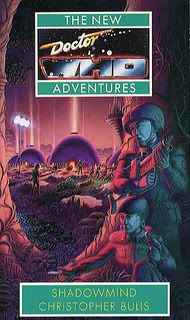 Shadowmind by Christopher Bulis
In Brief: A sentient asteroid forces a collective of psychic squirrels to create human duplicates in order to take over the galaxy via a giant carbon-blob.
All I can say is that I have looked into the madness, and it has looked into me.
And also F*ck this book.
I would not let Shadowmind win. I would not. I could not.
Stopping would have meant that it had won.
I was tempted oh-so-many-times to just give up and move on, but that would defeat the purpose of working through the run of The New Adventures. I still consider the series to be extremely worthwhile and have some of the greatest triumphs in the entire almost 50-year history of Doctor Who. It's just that along the way there is the occasional stumble.
The same as how when I first saw "Daleks in Manhattan" and wondered if I'd ever love anything again. Thankfully "Human Nature" came a mere 4 weeks later.
But ranking this...this...thing as a stumble would be too kind. Many times while reading I could feel my eyes refusing to lock on to the text and I had to often take a break before forging on. I now feel that the few poorer novels in the range so far (Genesys, Witch Mark, Deceit, etc.) were just softening me up for the barrage of tedium and stupidity that is Shadowmind. The sheer crapitude on display even begins at the terrible front-cover (BTW painted by the author as "proudly" advertised on the back).
The funny thing is that I didn't recall this book as being terrible, just unmemorable. Perhaps the 17 years since publication had erased the horror from my mind.
But what is it that made this book so awful? It's difficult to even know where to begin. At first things actually seem to be going ok. The Doctor has brought Ace and Bernice to the planet Tairngaire in the 27th-century for a holiday and to celebrate Ace's birthday. However soon they're thrust into the middle of things through an amazing plot-contrivance as they're the only spectators to the murder of a man who actually turns out to be a human duplicate (controlled by the Space Squirrels). Through some deduction I can't even now remember the Doctor helps the authorities to determine that the source of the duplicates has to do with the nearby planet of Arden.
So the first quarter or third of the book, while not being great (or even good) literature by any stretch is at least somewhat diverting. However that actually makes me hate Shadowmind just that little bit more due to the faint glimmer of promise. It's like a taunt.
The true awful of the book sets in as the Tardis is stolen and the three regulars board the starship Broadsword to help defeat the power behind the duplicates and also retrieve the ship. The biggest problem I had was that at this point the book becomes just-plain-wrong as the Doctor defers constantly to the military and basically stops being any sort of active presence in the novel. It was as if the book were being written by the author of the worst ever episode of Star Trek: Voyager (how do you choose just one?) who only knows of Doctor Who through watching a single episode of Resurrection of the Daleks.
The Doctor (and really the show in general) has always had an anarchic streak at the core of its appeal. Having the character here acting as a deferential consultant is just irks. He even wears combat fatigues and a helmet for much of the book, a sight I couldn't imagine ever happening in the show proper.
I hated hated hated it.
As well, Ace basically stops being recognisable as anything based on Sophie Aldred's performance from 1987-1989 in this book and instead turns into Starbuck from the new BSG, albeit 10-years early (and with less depth of character, which amazingly *is* possible). Or it's maybe more that she's now almost cartoon-like in her blood-lust (or rather just lust in general, bouncy-bouncy). Thankfully Benny is still around to be the fully-rounded regular character, although unfortunately here she's very much sidelined. As for the non-regular characters it's almost really impossible to really differentiate them since author Bulis is extremely poor at characterisation (as well as everything else). Plus they're really really boring.
Think Enterprise boring.
Almost a third of the book is spent as the Broadsword travels to Arden and we get many tests and minor battles on the way, each more tedious that the last. Unfortunately once everyone in landed the novel actually gets worse since the sheer idiocy of the "plot" is revealed. Main-villain Umbra, the afore-mentioned sentient asteroid, has a motivation of "just because" which just tops off so much else which is terrible in Shadowmind.
It's only been a few hours since I (with great effort) finished the book and already I'm getting a bit fuzzy on the details. It's almost as if my brain is rejecting the experience as one would a nasty assault. Unfortunately I willingly submitted myself so can't complain too badly, but really I should get over this completest nature and accept when continuing a pursuit will only cause more pain (yeah, right).
So to end this entry I'll just say that I found Shadowmind to be a literary Gom Jabbar, although far more sadistic and cruel.
Shadowmind by Christopher Bulis
In Brief: A sentient asteroid forces a collective of psychic squirrels to create human duplicates in order to take over the galaxy via a giant carbon-blob.
All I can say is that I have looked into the madness, and it has looked into me.
And also F*ck this book.
I would not let Shadowmind win. I would not. I could not.
Stopping would have meant that it had won.
I was tempted oh-so-many-times to just give up and move on, but that would defeat the purpose of working through the run of The New Adventures. I still consider the series to be extremely worthwhile and have some of the greatest triumphs in the entire almost 50-year history of Doctor Who. It's just that along the way there is the occasional stumble.
The same as how when I first saw "Daleks in Manhattan" and wondered if I'd ever love anything again. Thankfully "Human Nature" came a mere 4 weeks later.
But ranking this...this...thing as a stumble would be too kind. Many times while reading I could feel my eyes refusing to lock on to the text and I had to often take a break before forging on. I now feel that the few poorer novels in the range so far (Genesys, Witch Mark, Deceit, etc.) were just softening me up for the barrage of tedium and stupidity that is Shadowmind. The sheer crapitude on display even begins at the terrible front-cover (BTW painted by the author as "proudly" advertised on the back).
The funny thing is that I didn't recall this book as being terrible, just unmemorable. Perhaps the 17 years since publication had erased the horror from my mind.
But what is it that made this book so awful? It's difficult to even know where to begin. At first things actually seem to be going ok. The Doctor has brought Ace and Bernice to the planet Tairngaire in the 27th-century for a holiday and to celebrate Ace's birthday. However soon they're thrust into the middle of things through an amazing plot-contrivance as they're the only spectators to the murder of a man who actually turns out to be a human duplicate (controlled by the Space Squirrels). Through some deduction I can't even now remember the Doctor helps the authorities to determine that the source of the duplicates has to do with the nearby planet of Arden.
So the first quarter or third of the book, while not being great (or even good) literature by any stretch is at least somewhat diverting. However that actually makes me hate Shadowmind just that little bit more due to the faint glimmer of promise. It's like a taunt.
The true awful of the book sets in as the Tardis is stolen and the three regulars board the starship Broadsword to help defeat the power behind the duplicates and also retrieve the ship. The biggest problem I had was that at this point the book becomes just-plain-wrong as the Doctor defers constantly to the military and basically stops being any sort of active presence in the novel. It was as if the book were being written by the author of the worst ever episode of Star Trek: Voyager (how do you choose just one?) who only knows of Doctor Who through watching a single episode of Resurrection of the Daleks.
The Doctor (and really the show in general) has always had an anarchic streak at the core of its appeal. Having the character here acting as a deferential consultant is just irks. He even wears combat fatigues and a helmet for much of the book, a sight I couldn't imagine ever happening in the show proper.
I hated hated hated it.
As well, Ace basically stops being recognisable as anything based on Sophie Aldred's performance from 1987-1989 in this book and instead turns into Starbuck from the new BSG, albeit 10-years early (and with less depth of character, which amazingly *is* possible). Or it's maybe more that she's now almost cartoon-like in her blood-lust (or rather just lust in general, bouncy-bouncy). Thankfully Benny is still around to be the fully-rounded regular character, although unfortunately here she's very much sidelined. As for the non-regular characters it's almost really impossible to really differentiate them since author Bulis is extremely poor at characterisation (as well as everything else). Plus they're really really boring.
Think Enterprise boring.
Almost a third of the book is spent as the Broadsword travels to Arden and we get many tests and minor battles on the way, each more tedious that the last. Unfortunately once everyone in landed the novel actually gets worse since the sheer idiocy of the "plot" is revealed. Main-villain Umbra, the afore-mentioned sentient asteroid, has a motivation of "just because" which just tops off so much else which is terrible in Shadowmind.
It's only been a few hours since I (with great effort) finished the book and already I'm getting a bit fuzzy on the details. It's almost as if my brain is rejecting the experience as one would a nasty assault. Unfortunately I willingly submitted myself so can't complain too badly, but really I should get over this completest nature and accept when continuing a pursuit will only cause more pain (yeah, right).
So to end this entry I'll just say that I found Shadowmind to be a literary Gom Jabbar, although far more sadistic and cruel.









